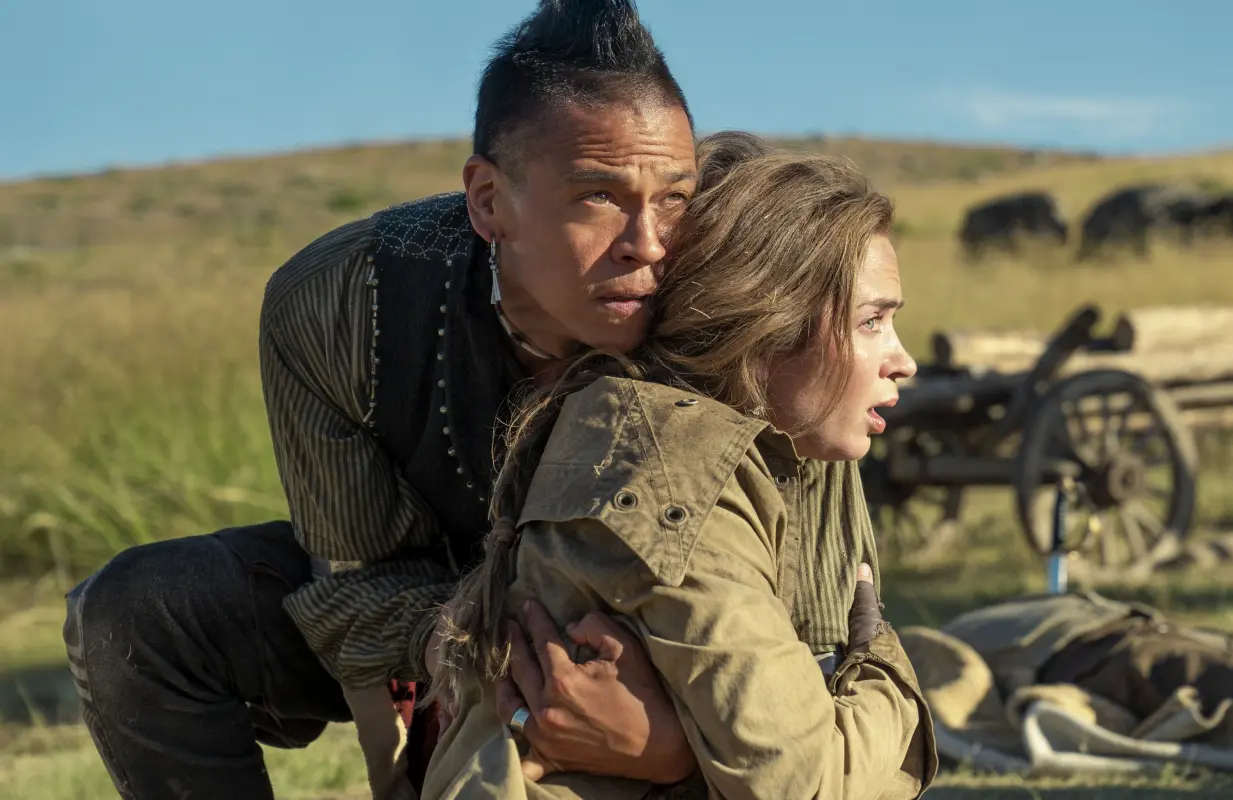The English Almost Has What It Takes to be a Revolutionary Western
-
 Chaske Spencer and Emily Blunt in The English (Photo: Diego Lopez Calvin/Prime Video)
Chaske Spencer and Emily Blunt in The English (Photo: Diego Lopez Calvin/Prime Video)Early in The English, Prime Video’s new Western miniseries, Pawnee cavalry scout Eli Whipp (Chaske Spencer) intervenes as his fellow soldiers taunt the widow and young son of a Native-American warrior they’ve just killed. His silent entry into the frame and his stony, impassive glare are enough to give him the status of an Eastwoodian hero. Yet the widow glares back at him with the heat of betrayal in her eyes, accusing him of being as complicit as the men who did the killing. Eli has lost enough and seen enough to seem unfazed, grimly determined to finish his service in the U.S. Army and tend the land promised to him under the Homestead Act. But a shade of regret falls over his eyes, revealing a deep grief that can’t be subsumed into the brutal pragmatism required to endure the American West. In that momentary swell of emotion, which quickly gives way to the necessity of survival, there’s a glimpse of a rich, complex show about guilt and identity and trauma, funneled through the perspective of people who aren’t typically foregrounded in Westerns.
The English is not that show. Not long after this sequence, the series’s true protagonist, Lady Cornelia Locke (Emily Blunt), steps off a covered wagon and into the dust. An English rose learning to bare her thorns, she wants revenge against the man responsible for her son’s death, and her quest becomes the show’s engine. Once Cornelia and Eli team up – after ending up in the clutches of a violent goon squad at a lonely outpost – we essentially follow the conventional narrative of a wronged white lady coming into her power with a little help from her friends.
That said, Blunt is captivating in the role, playing Cornelia with a tender, willful vibrancy and a raw-boned grief. She and Spencer also have potent chemistry, especially as their characters grow closer. Both have been grievously wounded by the titular English, which has left them unable to connect in the ways we might expect in traditional tales of a man and a woman thrust together in highly charged circumstances. Instead, they find a platonic intensity that feels deeply, even swooningly romantic.
Their bond is disrupted, however, by predictable subplots about stolen cattle and small-town murder. These B-stories focus on the titular English: British men from Cornelia’s old orbit who’ve come to America to make or steal their fortune. These characters repeatedly bemoan the unrelenting ugliness of “this country,” even as they’re responsible for it. That cynical insight could be effective if it were delivered with strategic spareness, but the series returns to it so often that we’re denied the rarer, more potent vantage point of the people who suffer because of that ugliness.
Similarly, The English is willing to show characters being violent — at one point, Cornelia finds herself staring down another white woman who collects Native-American scalps and mounts them on her wall — but has little to say about the generational legacies of that violence. Even Cornelia’s eventual reunion with a young boy she rescues from captivity becomes a chance for him to affirm her own worth (essentially as one of the “good ones”). From there, Cornelia’s perspective dominates more and more of the story, with Native people feeling like accessories to her healing. While she learns to shoot and fight, becomes the protector of various vulnerable and orphaned children, and channels righteous indignation at the treatment of the Indigenous population, we lose Eli’s story. That’s a shame because Spencer has the quiet, purposeful masculinity of old Hollywood heroes like Gary Cooper, with a modern vulnerability. He could absolutely anchor a series that was willing to explore the complexity of a character like Eli instead of merely glance at his conflicts.
Without diving into the brutal world it presents, pulling back its many layers of muck in pursuit of uncomfortable truths, The English has a fumbling quality, a kind of brattiness that holds cruelty up to the viewer and demands they find it meaningful in and of itself. It even includes flourishes like painterly shot composition and an anachronistic soundtrack of alt-rock tunes, as though aestheticizing the milieu will make it more potent. But depicting cruelty is easy. Understanding it is what takes real artistry.
All six episodes of The English premiere November 11 on Prime Video.
When she's not watching TV, Laura Bogart is writing books or tweeting at @LDBogart.
TOPICS: The English, Prime Video, Chaske Spencer, Emily Blunt